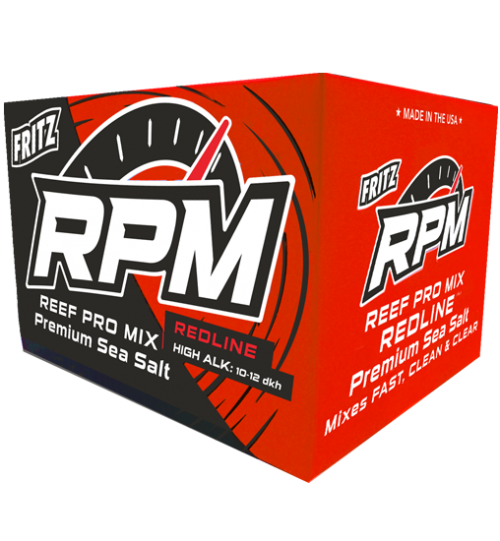About Fritz RPM Redline - High Alk Complete Marine Salt
Fritz Reef Pro Mix (RPM) High Alkalinity Formula is manufactured using only the highest quality raw materials. RPM High Alkalinity Formula contains all of the necessary major and minor elements of natural sea water that are utilized by living marine and reef animals along with enhanced alkalinity. Increased alkalinity has been shown to increase the growth of SPS. Fritz Reef Pro Mix High Alkalinity Formula Salt is manufactured in our own facility in small batches to ensure complete quality control, rather than outsourced to a generic chemical blender with uncertain quality standards. Our salt blending equipment is devoted solely to the production of marine salt blends, preventing contamination issues. Fritz’s unique production process promotes a uniform particle size minimizing stratification of the salts. Each batch is assigned a lot number and tested 2x by in-house quality control to ensure its chemical quality, purity and consistency before it is shipped. RPM is used by public aquariums, zoos, research institutions, destination retail locations and hobbyists worldwide
Parameters*
Salinity 35 ppt
Calcium 400-450 ppm
Magnesium 1300-1400 ppm
Alkalinity 10 - 11.5dkh
Strontium 9 ppm
Potassium 400 ppm
*Parameters reflect Fritz Aquatics’ QC pass ranges, the median is targeted. Be aware source water can greatly affect parameters, especially alkalinity. QC is conducted using RO/DI at a neutral pH and a TDS of 0.
Directions & Dosage
Directions & Dosage
MIXING DIRECTIONS
For best results, it is important to follow proper mixing instructions when using salt with elevated parameters like Fritz Aquatics Reef Pro Mix. See below for best practices when using RPM.
When mixing Fritz Reef Pro Mix, it is best to use RO/DI water quality checked by a TDS meter (TDS should be less than 10 ppm, 0 is preferred). Fill a clean mixing container (dedicated to saltwater mixing only) with desired amount of water to be prepared. For best results, use water between 70°-75°F (21°-24°C) when mixing RPM. Slowly add desired amount of RPM to the water to avoid an increase in temperature and precipitation. This helps to prevent precipitation of calcium, alkalinity and other elements. It is recommended to use a mixing pump and an airstone when mixing RPM. This will also help to avoid concentrated areas of material and precipitation. Using a properly calibrated refractometer, bring the water to the desired salinity. Once mixed to a clear solution, add a heater to the water to bring to the current temperature of your aquarium. It is recommended to allow two hours before performing a water change. If water does not mix clear, please contact us for further mixing tips before performing a water change.
DO NOT MIX DRY SALT DIRECTLY INTO SYSTEMS WITH LIVESTOCK PRESENT!
CAUTION: Keep out of reach of children. Not for human consumption. Generates slight heat when added to water; avoid handling with wet hands. Contact with dry powder may cause skin and/or eye irritation. In case of contact, flush eyes with cool water and seek immediate medical attention.
Storage: Store in a cool, dry place. Keep product tightly sealed.
RPM Calculator
Sizes
| Size | Treats | Item Number |
|---|---|---|
| 55 lb. Box | - | 80253 |
| 48 lb bucket | up to 180 gallons | 80271 |
FAQs
FAQs
See below for frequently asked questions regarding Fritz RPM Redline - High Alk Complete Marine Salt.
-
What is best practice for mixing RPM?
For best results when using salt with elevated parameters like Fritz Aquatics Reef Pro Mix, it is important to follow proper mixing instructions. See below for best practices when using RPM. 1. When mixing Fritz Reef Pro Mix, it is best to use RO/DI water quality checked by a TDS meter (TDS should be less than 10 ppm, 0 is preferred). 2. Fill a clean mixing container (dedicated to saltwater mixing only) with desired amount of water to be prepared. For best results, use water between 70° - 75°F (21° - 24°C) when mixing RPM. 3. Slowly add desired amount of RPM to the water to avoid an increase in temperature and precipitation. This helps to prevent precipitation of calcium, alkalinity and other elements. It is recommended to use a mixing pump and an airstone when mixing RPM. This will also help to avoid concentrated areas of material and precipitation. 4. Using a properly calibrated refractometer, bring the water to the desired salinity. 5. Once mixed to a clear solution, add a heater to the water to bring to the current temperature of your aquarium. It is recommended to allow two hours before performing a water change. If water does not mix clear, please contact us for further mixing tips before performing a water change. Do not mix dry salt directly into systems with livestock present! CAUTION: Keep out of reach of children. Not for human consumption. Generates slight heat when added to water; avoid handling with wet hands. Contact with dry powder may cause skin and/or eye irritation. In case of contact, flush eyes with cool water and seek immediate medical attention. Storage: Store in a cool, dry place. Keep product tightly sealed.
-
How long can RPM salt can stay mixed in water before precipitating out? I have a 55 gallon saltwater container but I don’t want it to go bad in between water changes.
If mixed to the correct salinity, it will not precipitate out. However, if it sits for a very long time (several weeks/months) you may want to check the alkalinity before adding to your aquarium.
-
I don’t have a scale at home, how can I measure salt for one gallon of water?
The closest approximation is 8 level tablespoons, or 1/2 cup of RPM salt per gallon. Once mixed, the salinity can be adjusted up or down with additional salt or water if needed.
Submit a Question
Can't find what you're looking for? Ask us a new question.
